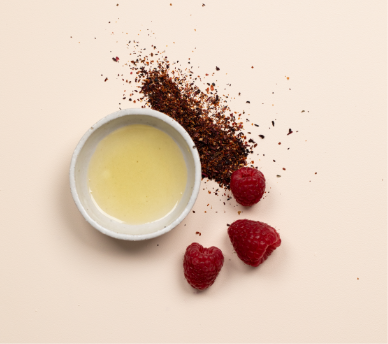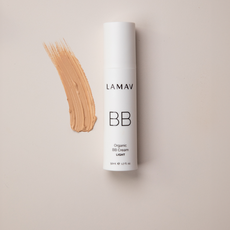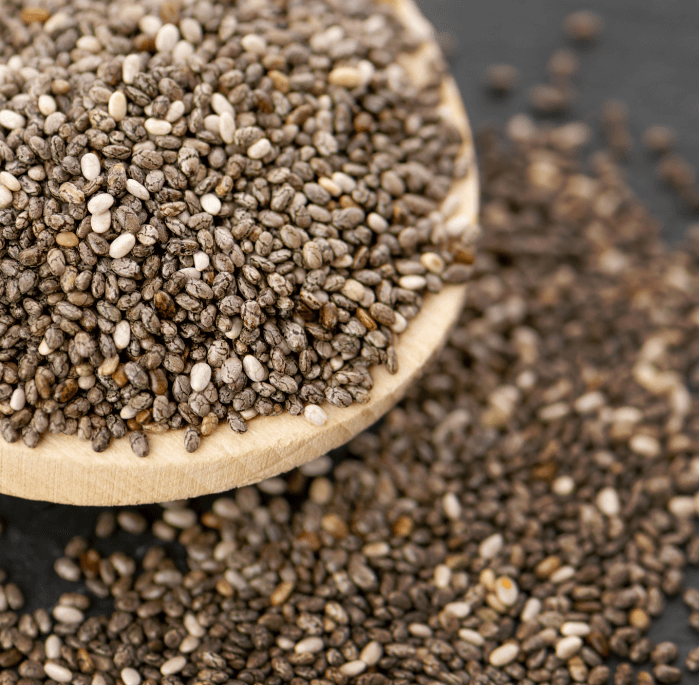Chia Seed Hype: Fact or Fiction?
Chia seeds have been used for centuries as a staple in Aztec and Mayan diets and are native to South America. More recently, they have started gaining popularity around the rest of the world due to their potent health benefits. These small seeds come from the desert plant Salvia Hispanic (a member of the mint family) and pack a real health punch when used raw, or in cooked foods. In this post, our social media manager/pescetarian L.J. (with education in holistic nutrition) and our eCommerce Director/Paleo Diet proponent Mike (with a background in biology) discuss this small seed, causing a big controversy.
Blood Sugar Regulator
L.J: Chia is purported to be ideal for diabetics as well as for preventing disease since it plays an integral role in regulating insulin levels. Chia can reduce insulin resistance and decrease abnormally high levels of insulin.
A study conducted on 67 (human) participants with Metabolic Syndrome was recently published in The Journal of Nutrition examined the results of a specific dietary pattern in which participants were given a mixture twice a day that included chia seeds to consume. Chia seeds were included because they promote a reduction in inflammatory response due to the presence of fatty acids and antioxidants.
“This study concluded that a dietary pattern of nopal, chia seed, soy protein, and oat showed a reduction in serum triglyceride levels, serum CRP (C-Reactive Protein test, indicates acute inflammation or infection), and insulin AUC.”
Mike: Other studies have demonstrated that chia seeds reduce fat via increasing insulin sensitivity in rats, but this study showed that the same results did not occur in humans. Given that the research is limited on insulin and chia seed consumption in humans, I don’t think a conclusive answer to this exists yet, which is something researchers [like Dr. Cordain] have also stated.
Vegan-Friendly and Gluten-Free
LJ: Chia seeds form a gel when mixed with water, which works perfectly as an egg replacement in baking. Simply mix one tablespoon of chia seeds with 3 tablespoons of water and leave to stand for 15 minutes.
Try this chocolate chia seed pudding, it’s delicious!
Mike: Can’t argue that one could use chia as a vegan-friendly egg replacement…but I can argue eating a vegan diet is not healthy in the long run (a topic for another day!)
Source of Healthy Omega-3 Fatty Acids
L.J: Chia is the richest plant source of heart-healthy fats and contains even more omega-3 acids (a type of unsaturated fat) than salmon! The best news is that even if you don’t eat fish, you can still receive the benefits and make them taste however you would like by adding the seeds to smoothies or including them in baking. Omega-3 is vital for healthy metabolism and also helps to keep cholesterol levels normal.
Mike: The point about the benefits of Omega-3 fatty acids is technically correct, except for the assumption that Chia is a good source of omega-3 for humans. The problem with all plant-based Omega-3 fatty acids (besides those from alga) is that they are ALA fatty acids, rather than DHA or EPA fatty acids. The human body cannot directly utilize ALA, and instead, it must be converted into DHA. However, this conversion process is incredibly inefficient, measured in single-digit percentage points if at all. Additionally, ALA is not converted into EPA, which can promote an imbalance in DHA: EPA fatty acid ratios in the body. When combined with the fact that most people consume way too much DHA compared to EPA, to begin with (grain-fed meats, not enough fish, not enough beneficial alga like spirulina and chlorella), Chia and other non-alga plant-based sources of omega-3s? such as flaxseed is a good source of omega-3s’ for humans.
L.J: What Mike is saying is true, but to understand why chia is a beneficial source of omega-3 fatty acids, especially for vegetarians and vegans, let’s break it down and make it a little easier to grasp. There is more than one type of omega-3 fatty acid, and ideally, we should be consuming all 3.
(Type 1)DHA & (Type 2)EPA
– main sources of omega-3
– found in cold-water fish such as salmon
– regulates cell activity,
very important for essential human molecular development (brain, skin, retina)
(Type 3) ALA
– available in plant sources such as chia, kiwi, and flax
– our bodies cannot make ALA, we must consume it
– our bodies can make DHA and EPA from ALA (however, poorly)
So, let’s put it into perspective and go back to the “popular opinion” that chia seeds contain more omega-3 than salmon.
100g of salmon contains approx. 0.4g of ALA
100g of chia seeds contain approx. 18g of ALA
A lot more than salmon, right? Right. However, keep in mind that chia contains no EPA or DHA while salmon will give you 0.4g of EPA and 1.4g of DHA. So, while you can convert (a little bit) of the ALA that is present in chia into DHA and EPA– it will only be worth it if you are a vegan or vegetarian that eats a lot of seeds.
This is one of the major reasons I choose to follow a pescetarian diet, which allows for me to eat (wild-caught) fish allowing me to get the correct amounts of all omega-3 fatty acids needed.
High In Antioxidants & A Powerful Disease Preventative
L.J: The properties found within chia seeds have demonstrated strong antioxidant activity in multiple human studies that have been performed in the recent past. The most important antioxidants found in chia are quercetin, chlorogenic acid, and caffeic acid. Scary sounding, I know…but …let’s take a closer look.
Dr. Mark Davis who led the 12 participant study on quercetin at the University of South Carolina’s Arnold School of Public Health, determined that “The natural, biological properties of quercetin include powerful antioxidant and anti-inflammatory activity, as well as the ability to boost the immune system and increase mitochondria (the powerhouse of the cell) in muscle and brain,” he went on to say, “While there’s no magic pill to make people get up and move, or to take the place of regular exercise, quercetin may be important in relieving the fatigue that keeps them sedentary and in providing some of the benefits of exercise,” he said. “We believe that this could be a breakthrough in nutrition.”
As someone who regularly consumes chia seeds, I can attest to the fact that it does provide an almost instant energy boost.
Chlorogenic Acid (another one of chia’s antioxidants) was found to prevent the growth of certain brain tumors in a study published on March 27, 2006, carried out by Borhane Annabi who holds a Canada Research Chair in Molecular Oncology (Tier-II) from the Canadian Institutes of Health Research. Furthermore, the nutritional benefits of this anticancer antioxidant are easily absorbed in the human body when consumed through natural foods like chia.
Mike: The problem with looking at a nutritional profile is that one assumes everything listed will be utilized/absorbed by the body. Unfortunately, this isn’t the case – bioavailability must always be taken into account. While again, the statement is technically correct (antioxidants are beneficial, and technically speaking, chia does contain antioxidants and a multitude of vitamins) it’s also misleading.
L.J: Not necessarily misleading. When you’re talking about the bioavailability of two antioxidants present in chia, chlorogenic acid, and caffeic acid, “Many studies have been done about the bioavailability of chlorogenic acid and caffeic acid in the gut. Based on a human study, only one-third of chlorogenic acid was absorbed in the small intestine of humans when almost all of the caffeic acid was …(Olthof et al., 2001).” – Zhong Ye, Iowa State University
Mike: Chia seeds (and most seeds and grain – which is why, for instance, the paleo diet does not include any grains) contain what are called anti-phytonutrients, or antinutrients. These chemicals (lectins, saponins, and others) are naturally occurring insecticides produced by plants to prevent decimation by insect predation. However, when consumed by humans, they prevent the uptake of nutrients both chemically and via inflammation of the GI tract. According to Dr. Cordain of The Paleo Diet: “Chia Seeds contain antinutrients, so that once in your body, the available calcium, iron, zinc, magnesium, and manganese from chia seeds are poorly absorbed, hence making chia seeds a poor dietary source for these minerals”.
He goes on to say “Chia seed consumption may contain one or more antinutrients which may promote chronic low-level inflammation.” In addition, other antinutrients found in chia seeds may adversely affect gut tissue including saponins which cause a “leaky gut”. When this occurs, the gut contents may then have access to the immune system which in turn becomes activated thereby causing chronic low-level systemic inflammation.”
In Summary…
Mike: Chia was a highly utilized food source by the ancient Maya & Aztec, but that does not mean that it is a quality food source for all people. Epigenetics has shown that humans adapt and change rapidly based on dietary consumption (1-3 generations) [Dr. Catherine Shanahan], and while Mayan & Aztec peoples may have been perfectly adept at digesting Chia, the average person today will not have such an ability.
L.J: Although the studies mentioned did produce encouraging outcomes (no matter what “side” you’re on) – keep in mind that more research still needs to be done, especially on humans, to produce reliable results. One person’s superfood could be another person’s chronic inflammation – (which can be said for any allergic food), so make sure to check with a nutritionist before going full force on any diet or long-term superfood consumption. It is not our intention to push a certain diet on anyone – we are merely speaking from personal preference based on what has worked for each of us.
Whether you support non-believers like Dr. Cordain who says, “Until further human studies are conducted, I would be cautious in recommending chia seeds for human consumption, particularly in people with food allergies or known autoimmune diseases,” or are a huge advocate of chia like Professor Wayne Coates( The University of Arizona), “I hate to call it a miracle food because there are too many miracles that turn out not to be, but it almost is. Literally, you could live on this stuff because it’s pretty much everything you need,” your opinion matters – so get in on the conversation in the comment section below!









